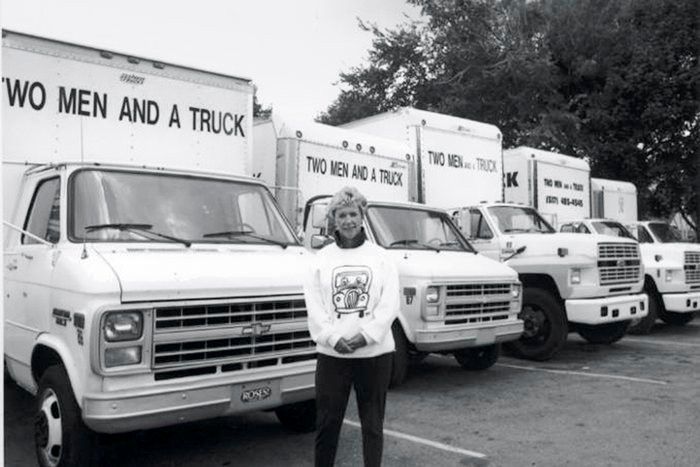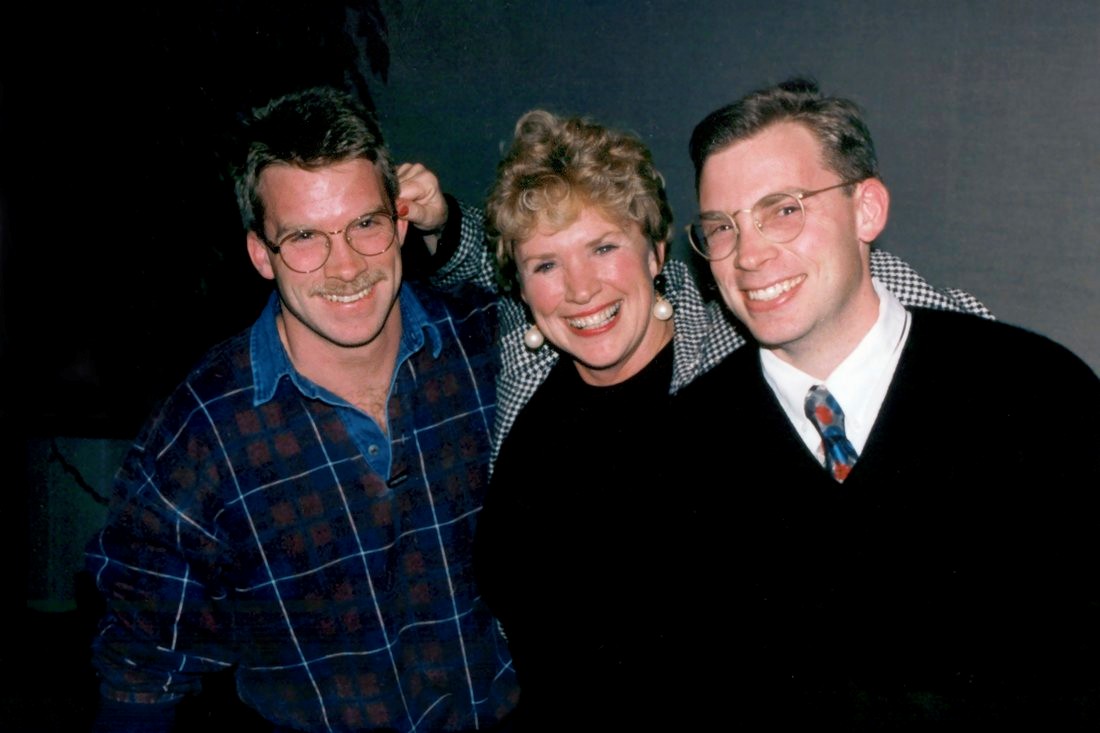兩個(gè)人一輛車(chē),,這位女士怎樣締造搬家王國(guó)

|
我叫瑪麗·艾倫·希茨,以前從沒(méi)想過(guò)要從商,。 我在美國(guó)密歇根州小城奧克莫斯長(zhǎng)大,,母親是護(hù)士,父親經(jīng)營(yíng)幾條小巴專(zhuān)線(xiàn),。當(dāng)時(shí)的女孩子長(zhǎng)大后要么當(dāng)護(hù)士要么當(dāng)老師,。 雖然考入了密歇根州立大學(xué),但我其實(shí)只想嫁個(gè)好老公,。20歲那年,,我嫁給高中時(shí)代的男友,生了三個(gè)孩子,,也沒(méi)讀完大學(xué),。 1980年,我離婚了,。兩個(gè)兒子喬恩和布里格都在念中學(xué),,他們都想周末賺點(diǎn)零用錢(qián),手邊正好有前夫留下的卡車(chē),。于是,,我和孩子們用Two Men and a Truck的名頭在本地報(bào)紙上打了一條小廣告,很快就有客戶(hù)打電話(huà)來(lái),。生意好的時(shí)候一天接到12通電話(huà),。 1985年,兩個(gè)孩子上大學(xué)離開(kāi)家,,還是總有客戶(hù)打電話(huà)來(lái),,我想也許能開(kāi)家搬運(yùn)公司。孩子們支持我創(chuàng)業(yè),,我請(qǐng)了兩個(gè)員工喬和埃爾默,,又花了350美元買(mǎi)下一輛破卡車(chē),總是出故障,。 在那之前,,我從沒(méi)管過(guò)人。喬問(wèn)我能不能開(kāi)卡車(chē)回他家,,我說(shuō)可以。我不知道他沒(méi)有駕照,,有一天警察打來(lái)電話(huà),,說(shuō)他在蘭辛城內(nèi)開(kāi)車(chē)狂飆,。 |
I never intended to go into business. I grew up in Okemos, Mich., where my mother was a nurse and my father owned some small bus lines. Back then, women either became a nurse or a teacher. I went to Michigan State University but I really wanted a “Mrs. degree.” So at 20, I married my high school boyfriend, had three children, and didn’t finish college. We divorced in 1980 when my two sons, Jon and Brig, were in high school. The boys wanted to make some spending money on the weekends, and my ex-husband had left his truck behind. So we put a little ad in the local paper for Two Men and a Truck, and people started calling. We got as many as 12 calls a day. In 1985 the boys were away at college, and I still kept getting calls, which led to this idea to start a moving company. My boys said go for it, so I hired two men named Joe and Elmer, and paid $350 for an old truck that broke down all the time. I hadn’t ever supervised anyone before. When Joe asked if he could keep the truck at his home, I said okay. I didn’t know he didn’t have a driver’s license, and one day the police called me, saying he had been racing around Lansing. |

|
我只能去取回卡車(chē),找別人把喬那趟差事跑完,。又有一次,,兩個(gè)員工在卡車(chē)駕駛艙里打了起來(lái),客戶(hù)打來(lái)電話(huà)投訴,。他們兩人在我手下干了一年,,后來(lái)喬決定離開(kāi)。我當(dāng)時(shí)肯定昏了頭,,他們比起現(xiàn)在的搬運(yùn)工太不專(zhuān)業(yè)了,。 那時(shí)候市場(chǎng)推廣很簡(jiǎn)單。我們?cè)诳ㄜ?chē)身上寫(xiě)著“Two Men and a Truck?…?又快又便宜”,,就好像活動(dòng)的廣告牌,。我做了些可以撕下的宣傳單,貼在雜貨店和洗衣房的布告欄里,,還在本地報(bào)紙上打了兩行字的廣告,,一周廣告費(fèi)約兩美元。 每個(gè)工作日,,我白天在州政府做程序員,,晚上接搬運(yùn)的活,周末也干搬運(yùn),。我喜歡這門(mén)生意,。州政府辦公室的同事拿我開(kāi)玩笑,說(shuō)我的公司永遠(yuǎn)不會(huì)成什么氣候,。 可后來(lái),,公司第一次掙到了1000美元,我感到干勁十足,。我開(kāi)了十張支票,,每張100美元,然后統(tǒng)統(tǒng)捐給本地的慈善機(jī)構(gòu),。第二年,,我們掙了18萬(wàn)美元。 我又買(mǎi)了一輛卡車(chē),,新招了三名員工,,之后每年5月都添置車(chē)輛,后來(lái)我媽媽家的后院停了五輛卡車(chē),。公司的營(yíng)業(yè)收入逐年增長(zhǎng),,1989年達(dá)到56萬(wàn)美元。 后來(lái),,州政府一次升職機(jī)會(huì)沒(méi)給我,,我就辭了工作,,全職開(kāi)公司。我曾經(jīng)聽(tīng)到有人議論說(shuō),,“她才不會(huì)走呢”,,但我實(shí)在受不了了。 一些大搬家公司討厭我們,。他們的卡車(chē)容量大,,通常做跑遍全國(guó)的遠(yuǎn)途業(yè)務(wù)。我們只做短途搬運(yùn),。上世紀(jì)90年代初,,美國(guó)經(jīng)濟(jì)不景氣,大公司就盯上了我們的生意,。搬運(yùn)行業(yè)是個(gè)排外的圈子,,大公司為了搶生意制造了各種壁壘。 我一點(diǎn)也不懂搬運(yùn)方面的法律,。有一天,,州警察局的人上門(mén)找我查看文件資料,發(fā)現(xiàn)有七趟活沒(méi)有獲得搬家執(zhí)照,。我只得上了法庭,,為七次違法經(jīng)營(yíng)業(yè)務(wù)支付罰款100美元。我成了罪犯,,照片還上了蘭辛地方報(bào)紙,。 那時(shí)候,搬家執(zhí)照是家族傳下來(lái)的,,外人想要就得找人買(mǎi),。大公司不希望我們拿到執(zhí)照,我們就成立了一家名叫Busy Bee Movers的新公司,,買(mǎi)到搬家執(zhí)照后轉(zhuǎn)讓給Two Men and a Truck,。 公司的生意越做越大,很快加盟連鎖店開(kāi)遍了密歇根和佛羅里達(dá),。前十家連鎖店是我的三個(gè)孩子,、一個(gè)前男友和一些做生意過(guò)程中認(rèn)識(shí)的人開(kāi)的。 1994年,,共和黨找我競(jìng)選密歇根州的參議員,。我就讓女兒梅蘭妮接手特許連鎖經(jīng)營(yíng)的搬家公司,兒子喬恩負(fù)責(zé)密歇根本地的搬家公司,。公司有22名員工,,在一棟只有一個(gè)衛(wèi)生間的老房子里工作。 我喜歡和孩子們共事。但意見(jiàn)不一致時(shí)也很容易吵起來(lái),。我的辦公室里總是放著面巾紙,,大多是自己用的。當(dāng)時(shí)壓力真的很大,。 后來(lái)我決定不去競(jìng)選參議員?;氐焦竞笾粨?dān)任顧問(wèn),,女兒繼續(xù)當(dāng)總裁。2008年經(jīng)濟(jì)衰退以前,,公司年收入增速高達(dá)30%,,現(xiàn)在年增速回落到10%。 2017年,,我接受了股權(quán)買(mǎi)斷協(xié)議,,然后正式退休。能創(chuàng)立一家增加工作崗位并且能回饋社區(qū)的公司,,我感到很驕傲,。 女性的職業(yè)生涯無(wú)疑有天花板。工作中,,女性必須拿出105%的精力奮勇前進(jìn),。我不知道職場(chǎng)天花板會(huì)不會(huì)有一天徹底消失。我的應(yīng)對(duì)方式是創(chuàng)業(yè)開(kāi)公司,,結(jié)果還行,。我鼓勵(lì)其他女性也找到屬于自己的事業(yè)。 最佳建議 瑪麗·艾倫·希茨 Two Men and a Truck創(chuàng)始人 無(wú)視懷疑你能力的人,。有一位當(dāng)?shù)卮髮W(xué)的教授對(duì)我說(shuō):“你沒(méi)有什么可以授權(quán)加盟經(jīng)營(yíng)的,。”有位律師告訴我:“你得把業(yè)務(wù)做到幾十萬(wàn)美元才能搞加盟連鎖,。別費(fèi)心思了,。”要我說(shuō),,千萬(wàn)別被這種人打擊信心,。 盡可能彌補(bǔ)過(guò)失。如果在搬家公司搬運(yùn)過(guò)程中損壞了東西,,通常的賠償標(biāo)準(zhǔn)是每磅(約合0.45公斤)0.06美元,。可如果弄壞一張十磅重的桌子只賠0.6美元,,其實(shí)并不合理,。我們的做法是送給客戶(hù)一個(gè)寫(xiě)著“很抱歉”的盒子,里面裝一只咖啡杯和一張禮品券,,并且盡量修補(bǔ)損壞的物品,。這樣客戶(hù)的感覺(jué)就很不一樣,。(財(cái)富中文網(wǎng)) 本文首發(fā)于2017年12月15日期《財(cái)富》雜志,原文標(biāo)題為《一位女士,、兩名男士和一輛卡車(chē)》,。 譯者:Pessy 審稿:夏林 |
I had to get the truck and find people to finish that job. Another time, the two men got into a fight in the cab of the truck, and a customer called me to report it. They continued working for me for a year until Joe decided to leave. I must have been nuts. They’re not the kind of movers we have today. Marketing was simple. We had signage on the truck, which said, “Two Men and a Truck?…?Fast & Cheap,” which was like having a billboard. I’d make tear-off strips and put them on bulletin boards in grocery stores and laundries. A two-line ad in the local paper cost about $2 a week. I was working for the state as a programmer during the day and set up moves at night and on the weekends. I loved owning my own business. People at the office made fun of me, saying it would never amount to anything. But that first year I made $1,000 and felt so empowered. I sat down and wrote 10 checks of $100 each, and I gave the money away to local charities. The second year we made $180,000. I added one truck and three employees every May until we had five trucks parked in my mom’s backyard. Annual revenue grew every year. In 1989 we made $560,000. I quit my day job and went full-time after being overlooked for a promotion. I heard somebody say, “She’ll never leave,” and I couldn’t stand it there anymore. The big moving companies hated us. Their trucks were big, and they did moves cross-country. We did small moves, but when the economy got bad in the early ’90s, they wanted our business. The moving industry is a good-old-boys’ network, and they put up all kinds of barriers to stop me. I didn’t know anything about moving laws, and one day the state police came and looked at our paperwork. They found seven moves done without moving licenses, so I had to go to court, and I paid a fine of $100 for seven misdemeanors. My picture was in the Lansing State Journal for being a criminal. Back then, moving licenses were passed from father to son, and you could only get one if someone sold it to you. The big guys didn’t want us to have a license, so we incorporated as Busy Bee Movers, bought a license, then immediately transferred it to Two Men and a Truck. The business grew, and soon we had franchises across Michigan and Florida. The first 10 franchises went to my three children, an old boyfriend, and other people I picked up along the way. In 1994 the Republican Party asked me to run for the Michigan State Senate, so I asked my daughter, Melanie, to take over the franchising company, while Jon would run the local moving company. We had 22 employees working out of an old house with one bathroom. I loved working with my kids, but if you had a disagreement, it was very emotional. I kept a box of Kleenex in my office, mostly for me. It was very stressful. I decided not to run for office, but my daughter remained president when I returned to the company as an adviser. We had 30% growth annually until 2008, when the recession hit. We’re back up to 10% growth annually now. I took a buyout in 2017 and retired. I’m really proud of building a company that creates jobs for other people and gives back to the community. There’s definitely a glass ceiling for women. Women have to work 105% to get ahead. I don’t know if that glass ceiling will ever break. But starting my own company worked for me. I encourage other women to do the same. Best Advice Mary Ellen Sheets Founder, Two Men and a Truck Ignore doubters. A professor at a ?local college told me, “You have nothing to franchise.” An attorney told me, “You’ll need hundreds of thousands of dollars to franchise. Don’t bother.” I say, don’t be dragged down by people like that. Make it right. The standard reimbursement for moving breakages used to be 6¢ a pound. If we broke a 10-pound ?table, we’d be liable for 60¢, but that’s not right. So we used to give an “I’m sorry” box to customers, with a coffee mug and gift certificate in it, along with fixing whatever we broke. It made a big difference.?? A version of this article appears in the Dec. 15, 2017 issue of Fortune with the headline “One Woman, Two Men, and a Truck.” |













